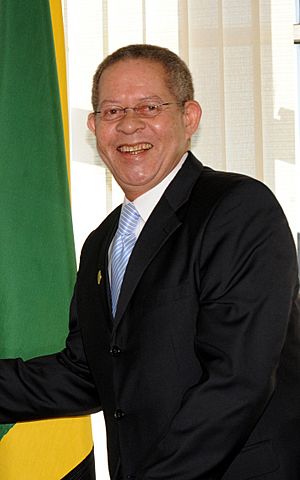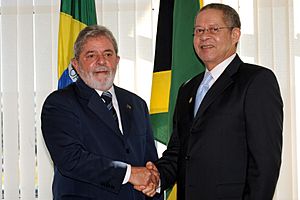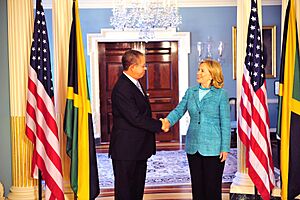Bruce Golding facts for kids
Quick facts for kids
The Most Honourable
Bruce Golding
ON OJ
|
|
|---|---|
 |
|
| 8th Prime Minister of Jamaica | |
| In office 11 September 2007 – 23 October 2011 |
|
| Monarch | Elizabeth II |
| Governor General | Sir Kenneth Hall Sir Patrick Allen |
| Deputy | Kenneth Baugh |
| Preceded by | Portia Simpson-Miller |
| Succeeded by | Andrew Holness |
| Leader of the Jamaica Labour Party | |
| In office 21 January 2005 – 20 November 2011 |
|
| Preceded by | Edward Seaga |
| Succeeded by | Andrew Holness |
| Leader of the Opposition | |
| In office 21 January 2005 – 11 September 2007 |
|
| Prime Minister | P. J. Patterson Portia Simpson-Miller |
| Preceded by | Edward Seaga |
| Succeeded by | Portia Simpson-Miller |
| Member of Parliament for Kingston West |
|
| In office 21 January 2005 – 29 December 2011 |
|
| Preceded by | Edward Seaga |
| Succeeded by | Desmond McKenzie |
| Personal details | |
| Born | 5 December 1947 Chapelton, Colony of Jamaica |
| Political party | Labour Party |
| Spouse | |
| Children | Sherene Golding Campbell |
| Education | St. George's College |
| Alma mater | University of the West Indies |
Orette Bruce Golding (born 5 December 1947) is a Jamaican politician who was the eighth Prime Minister of Jamaica. He served from 2007 to 2011. He was also the leader of the Jamaica Labour Party (JLP) from 2005 until he stepped down in 2011.
Contents
Early Life and Education
Growing Up in Politics
Bruce Golding was born to Tacius and Enid Golding, who were both teachers. He was the third of four children. When he was two years old, his family moved to the St. Faiths district in St. Catherine. They lived there for five years before moving to Kingston in 1955.
Politics was a big part of Golding's childhood. His father, Tacius Golding, was elected to the House of Representatives in 1949. He held this position for 22 years. Tacius was also the first Speaker of the House after Jamaica became independent.
School and University
Bruce Golding attended St. George's College for five years. He then went to Jamaica College for his A-Level studies. In 1966, he was the head boy at his school. That year, he was part of the group that welcomed Emperor Haile Selassie I of Ethiopia to the school.
After high school, Golding went to the University of the West Indies (UWI). He studied economics and graduated in 1969.
Political Career
Golding started his political career in the Jamaica Labour Party (JLP). He became the chairman of the party. In 1995, he and some other members left to start a new party called the National Democratic Movement (NDM).
He returned to the JLP in 2002. A year later, in 2003, he was elected as the party's chairman again. On 20 February 2005, he became the leader of the JLP, taking over from Edward Seaga. This also made him the Leader of the Opposition in Parliament.
Over his career, Golding represented three different areas as a Member of Parliament: West St. Catherine, Central St. Catherine, and Kingston West.
Time as Prime Minister
In the general election on 3 September 2007, Bruce Golding led the JLP to a close victory. The JLP won 32 seats in Parliament, while the People's National Party (PNP) won 28. This victory ended 18 years of the PNP being in power.
Golding was officially sworn in as Jamaica's eighth prime minister on 11 September 2007.
In April 2011, Golding suggested that Jamaica should become a republic. This would mean the country would no longer have the British monarch as its head of state. He said this change would not be a sign of disrespect to the monarchy.
A Major Disagreement
In 2010, Golding's government faced a major challenge. The government had a disagreement with the United States over a legal request. This led to a controversy about whether the government had hired a U.S. law firm, Manatt, Phelps & Phillips, to help solve the issue.
At first, Golding said the government did not hire the firm. Later, on 11 May 2010, he explained in Parliament that he had approved the plan. However, he said the plan was for the JLP party to hire the firm, not the government itself.
This news caused a lot of debate. Some groups called for him to resign as prime minister. On 17 May 2010, Golding spoke to the nation on television. He apologized for his role in the situation. He offered to step down, but his party's leaders rejected his offer and showed their support for him.
State of Emergency
After the government decided to move forward with the U.S. legal request, there was unrest in a Kingston community. Supporters of the person involved in the request put up blockades. This led to serious violence.
On 23 May 2010, Prime Minister Golding declared a state of public emergency in the parishes of Kingston and St. Andrew. This gave the security forces special powers to restore order. The Jamaican army and police forces entered the community to remove the blockades and bring back peace. The operation lasted for several days.
Vote of No Confidence
Because of the controversy, the opposition party, the PNP, called for a motion of no confidence against Golding. This is a formal process in Parliament to challenge a leader's position. After a four-hour debate, the motion was defeated. The members of Parliament voted along party lines, and Golding remained in office.
Resignation
On 25 September 2011, Golding announced that he would not run for re-election as leader of the JLP. He also said he would step down as prime minister once a new leader was chosen.
In a statement, Golding said, "The challenges of the last four years have taken their toll and it was appropriate now to make way for new leadership."
His party's executive members voted to reject his resignation, but Golding's decision was final. He was succeeded by Andrew Holness as both party leader and prime minister.
Personal Life
Golding married Lorna Charles in 1975. They have three children: Sherene, Steven, and Ann-Merita. Golding is an Anglican.
See also
 In Spanish: Bruce Golding para niños
In Spanish: Bruce Golding para niños
- Cabinet of Jamaica
 | Shirley Ann Jackson |
 | Garett Morgan |
 | J. Ernest Wilkins Jr. |
 | Elijah McCoy |



